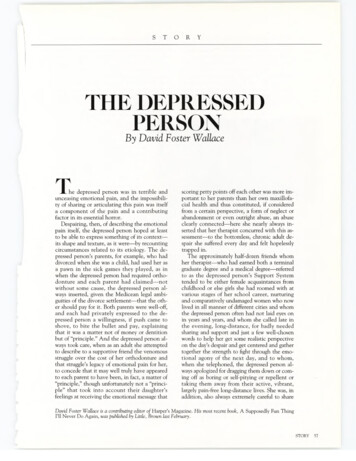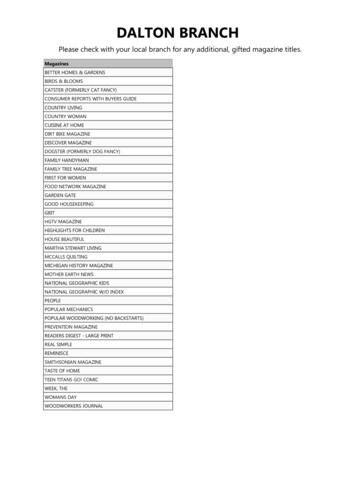
Transcription
STORYTHE DEPRESSEDPERSONBy David Foster WallaceLeindepressed person wasterrible andunceasing emotional pain, and the impossibility of sharing or articulating this pain was itselfa component of the pain and a contributingfactor in its essential horror.Despairing, then, of describing the emotionalpain itself, the depressed person hoped at leastto be able to express something of its contextits shape and texture, as it were-by recountingcircumstances related to its etiology. The depressed person's parents, for example, who haddivorced when she was a child, had used her asa pawn in the sick games they played, as inwhen the depressed person had required orthodonture and each parent had claimed-notwithout some cause, the depressed person always inserted, given the Medicean legal ambiguities of the divorce settlement-thatthe other should pay for it. Both parents were well-off,and each had privately expressed to the depressed person a willingness, if push came toshove, to bite the bullet and pay, explainingthat it was a matter not of money or dentitionbut of "principle." And the depressed person always took care, when as an adult she attemptedto describe to a supportive friend the venomousstruggle over the cost of her orthodonture andthat struggle's legacy of emotional pain for her,to concede that it may well truly have appearedto each parent to have been, in fact, a matter of"principle," though unfortunately not a "principle" that took into account their daughter'sfeelings at receiving the emotional message thatscoring petty points off each other was more important to her parents than her own maxillofacial health and thus constituted, if consideredfrom a certain perspective, a form of neglect orabandonment or even outright abuse, an abuseclearly connected-hereshe nearly always inserted that her therapist concurred with this assessment-to the bottomless, chronic adult despair she suffered every day and felt hopelesslytrapped in.The approximately half-dozen friends whomher therapist-who had earned both a terminalgraduate degree and a medical degree-referredto as the depressed person's Support Systemtended to be either female acquaintances fromchildhood or else girls she had roomed with atvarious stages of her school career, nurturingand comparatively undamaged women who nowlived in all manner of different cities and whomthe depressed person often had not laid eyes onin years and years, and whom she called late inthe evening, long-distance, for badly neededsharing and support and just a few well-chosenwords to help her get some realistic perspectiveon the day's despair and get centered and gathertogether the strength to fight through the emotional agony of the next day, and to whom,when she telephoned, the depressed person always apologized for dragging them down or coming off as boring or self-pitying or repellent ortaking them away from their active, vibrant,largely pain-free long-distance lives. She was, inaddition, also always extremely careful to shareDavid Foster Wallace is a contributing editor of Harper's Magazine. His most recent book, A Supposedly Fun ThingI'll Never Do Again, was published by Little, Brown last February.STORY57
with the friends in her Support System her belief that it would be whiny and pathetic to playwhat she derisively called the "Blame Game"and blame her constant and indescribable adultpain on her parents' traumatic divorce or theircynical use of her. Her parents had, after all-asher therapist had helped the depressed person tosee---done the very best they could do with theemotional resources they'd had at the time. Andshe had, the depressed person always inserted,laughing weakly, eventually gotten the ortho-donture she'd needed. The former acquaintances and classmates who composed her Support System often told the depressed personthat they just wished she could be a little lesshard on herself, to which the depressed personresponded by bursting involuntarily into tearsand telling them that she knew all too wellthat she was one of those dreaded types ofeveryone's grim acquaintance who call at inconvenient times and just go on and on aboutthemselves. The depressed person said that shewas all too excruciatingly aware of what a joyless burden she was, and during the calls she always made it a point to express the enormousgratitude she felt at having a friend she couldcall and get nurturing and support from, however briefly, before the demands of that friend'sfull, joyful, active life took understandable58HARPER'S MAGAZINE / JANUARY 1998precedence and required her (i.e., the friend)to get off the telephone.The feelings of shame and inadequacy thedepressed person experienced about callingmembers of her Support System long-distancelate at night and burdening them with herclumsy attempts to describe at least the contextual texture of her emotional agony were an issue on which she and her therapist were currently doing a great deal of work in their timetogether. The depressed person confessed thatwhen whatever supportive friend shewas sharing with finally confessed thatshe (i.e., the friend) was dreadfullysorry but there was no helping it sheabsolutely had to get off the telephone, and had verbally detached thedepressed person's needy fingers fromher pantcuff and returned to the demands of her full, vibrant long-distance life, the depressed person alwayssat there listening to the empty apiandrone of the dial tone feeling evenmore isolated and inadequate and unempathized-with than she had beforeshe'd called. The depressed personconfessed to her therapist that whenshe reached out long-distance to amember of her Support System she almost always imagined that she coulddetect, in the friend's increasinglylong silences and/or repetitions of encouraging cliches, the boredom andabstract guilt people always feel whensomeone is clinging to them and being a joyless burden. The depressedperson confessed that she could wellimagine each "friend" wincing nowwhen the telephonerang late atnight, or during the conversationlooking impatiently at the clock or directing silent gestures and facial expressions communicating her boredom andfrustration and helpless entrapment to all theother people in the room with her, the expressive gestures becoming more desperate and extreme as the depressed person went on and onand on. The depressed person's therapist's mostnoticeable unconscious personal habit or ticconsisted of placing the tips of all her fingerstogether in her lap and manipulating them idlyas she listened supportively, so that her matedhands formed various enclosing shapes-e.g.,cube, sphere, cone, right cylinder-andthenseeming to study or contemplate them. The depressed person disliked the habit, though shewas quick to admit that this was chiefly because it drew her attention to the therapist'sfingers and fingernails and caused her to compare them with her own.Illustrationsby Mark Ulriksen
The depressed person shared that she couldremember, all too clearly, how at her thirdboarding school she had once watched herroommate talk to some boy on their room'stelephone as she (i.e., the roommate) madefaces and gestures of entrapped repulsion andboredom with the call, this popular, attractive,and self-assured roommate finally directing atthe depressed person an exaggeratedpantomime of someone knocking on a door untilthe depressed person understood that she wasto open their room's door and stepoutside and knock loudly on it so asto give the roommate an excuse toend the call. The depressed personhad shared this traumatic memorywith members of her Support Systemand had tried to articulate how bottomlessly horrible she had felt itwould have been to have been thatnameless pathetic boy on the phoneand how now, as a legacy of that experience, she dreaded, more than almost anything, the thought of everbeing someone you had to appealsilently to someone nearby to helpyou contrive an excuse to get off thephone with. The depressed personwould implore each supportive friendto tell her the very moment she (i.e.,the friend) was getting bored or frustrated or repelled or felt she (i.e., thefriend) had other more urgent or interesting things to attend to, to pleasefor God's sake be utterly candid andfrank and not spend one momentlonger on the phone than she was absolutely glad to spend. The depressedperson knew perfectly well, of course,she assured the therapist;' how such arequest could all too possibly be heardnot as an invitationto get off thetelephoneat will but actually as a needy,manipulative plea not to get offnever to get off-the telephone.The depressed person's parents had eventually split the cost of her orthodonture; a professional arbitrator had been required in orderI The multiformshapesthe therapist's mated fingersassumed nearly alwaysresembled various geometricallydiverse cages, an association which the depressed person had not shared with the therapist because its symbolism seemed too overt and simplistic to waste theirvaluable time together on. The therapist's fingernailswere long and well-maintained, whereas the depressedperson's nails were compulsively bitten so short andragged that the quick sometimes protruded and beganspontaneously to bleed.to structure this compromise and, subsequently, to negotiate shared payment schedules forthe depressed person's boarding schools andHealthy Eating Lifestyle summer camps andoboe lessons and car and collision insurance,as well as for the cosmetic surgery needed tocorrect a malformation of the anterior spineand alar cartilage of the depressed person'snose which had given her what felt like an excruciatinglypronouncedand snout ish pugnose and had, coupled with the external or-thodontic retainer she had to wear twenty-twohours a day, made looking at herself in themirrors of her rooms at her boarding schoolsfeel like more than any person could possiblystand. Also, in the year that her father remarried, he, in either a gesture of rare uncompromised caring or a coup de grace that the depressed person's mother had said was designedto make her own feelings of humiliation andsuperfluousness complete, had paid in toto forthe riding lessons, jodhpurs, and outrageouslyexpensive boots the depressed person hadneeded in order to gain admission to her second-to-last boarding school's Riding Club, afew of whose members were the only girls atthis school who the depressed person felt,she had confessed to her father on the telephone in tears late one truly horrible night,STORY59
even remotely accepted her at all and aroundwhom the depressed person hadn't felt so totally pig-nosed and brace-faced and inferiorthat it had been a daily act of enormous personal courage and will just to leave her roomand go eat dinner in the dining hall.The professional arbitrator her parents'lawyers had agreed on for help in structuringtheir compromises had been a highly respectedconflict-resolution specialist named Walter D.("Walt") Ghent Jr. The depressed person hadnever even laid eyes on Walter D. ("Walt")Ghent [r., though she had been shown hisbusiness card-completewith its parenthesized invitation to informality-andhis namehad been invoked bitterly in her hearing oncountless occasions, along with the fact thathe billed at a staggering 130 an hour plus expenses. Despite overwhelming feelings of reluctance on the part of the depressed person,the therapist had strongly supported her intaking the risk of sharing with members of herSupport System an important emotional realization she (i.e., the depressed person) hadachieved during an Inner-Child-Focused Experiential Therapy Retreat Weekend whichthe therapist had supported her in taking therisk of enrolling in and giving herself openmindedly over to the experience of. In the 1.e.-F.E.T. Retreat Weekend's Small-GroupDrama- Therapy Room, other members of hersmall group had role-played the depressed person's parents and the parents' significant others and attorneys and myriad other emotionally painful figures from her childhood, and hadslowly encircled the depressed person, movingin steadily together so that she could not escape, and had (i.e., the small group had) dramatically recited specially prepared lines designed to evoke and reawaken trauma, whichhad almost immediately evoked in the depressed person a surge of agonizing emotionalmemories and had resulted in the emergenceof the depressed person's Inner Child and acathartic tantrum in which she had struck repeatedly at a stack of velour cushions with abat of polystyrene foam and had shrieked obscenities and had reexperienced long-pent-upwounds and repressed feelings, the most important of which being a deep vestigial rageover the fact that Walter D. ("Walt") GhentJr. had been able to bill her parents 130 anhour plus expenses for playing the role of mediator and absorber of shit while she had hadto perform essentially the same coprophagousservices on a more or less daily basis for free,for nothing, services which were not only grossly unfair and inappropriate for a child to feelrequired to perform but which her parents hadthen turned around and tried to make her, the60HARPER'SMAGAZINE/jANUARY1998depressed person herself, as a child, feel guiltyabout the staggering cost of Walter D. Ghent[r., as if the cost and hassle were her fault andundertaken only on her spoiled little fat-thighedpig-nosed shiteating behalf instead of simplybecause of her fucking parents' utterly fuckingsick inability to communicate directly andshare honestly and work through their ownsick issues with each other. This exercise hadallowed the depressed person to get in touchwith some really core resentment-issues, thesmall-group facilitator at the Inner-ChildFocused Experiential Therapy Retreat Weekend had said, and could have represented a realturning point in the depressed person's journeytoward healing, had the public shrieking andvelour-cushion-pummelingnot left the depressed person so emotionally shattered anddrained and traumatized and embarrassed thatshe'd felt she had no choice but to fly backhome that night and miss the rest of theWeekend.The eventual compromise which she and hertherapist worked out together afterward wasthat the depressed person would share the shattering emotional realizations of the I.-e.-F.E.T.R. Weekend with only the two or threevery most trusted and unjudgingly supportivemembers of her Support System, and that shewould be permitted to reveal to them her reluctance about sharing these realizations and toinform them that she knew all too well howpathetic and blaming they (i.e., the realizations) might sound. In validating this compromise, the therapist, who by this time had lessthan a year to live, said that she felt she couldsupport the depressed person's use of the word"vulnerable" more wholeheartedly than shecould support the use of the word "pathetic,"which word (i.e., "pathetic") struck the therapist as toxically self-hating and also somewhatmanipulative, an attempt to protect oneselfagainst the possibility of a negative judgmentby making it clear that one was already judgingoneself far more negatively than any listenercould have the heart to. The therapist-whoduring the year's cold months, when the abundant fenestration of her home office kept theroom chilly, wore a pelisse of hand-tanned Native American buckskin that formed a somewhat ghastlil y moist-looking flesh-coloredbackground for the enclosing shapes her handsformed in her lap-said that she felt comfortable enough in the validity of their therapeuticconnection together to point out that a chronic mood disorder could itself be seen as constituting an emotionally manipulative defensemechanism: i.e., as long as the depressed person had the depression's affective discomfortto preoccupy her, she could avoid feeling the
deepSvestigialchildhoodwounds whichshe was apparently determined tokeep repressed at all costs)everal months later, when the depressedperson's therapist suddenly died-as the resultof what was determined to be an "accidentally"toxic combination of caffeine and homeopathicappetite suppressant but which, given the therapist's extensive medical background, only aperson in very deep denial indeed could fail tosee must have been, on some level, intentional-withoutleaving any sort of note or cassetteor encouraging last words for any of the patientswho had come to connect emotionally with thetherapist and establish some degree of intimacyeven though it meant making themselves vulnerable to the possibility of adult loss- andabandonment-traumas,the depressed personfound this fresh loss so shattering, its resultanthopelessness and despair so unbearable, that shewas forced now to reach frantically and repeatedly out to her Support System, calling three oreven four different supportive friends in anevening, sometimes calling the same friendstwice in one night, sometimes at a very latehour, and sometimes, even, the depressed person felt sickeningly sure, either waking them upor maybe interruptingthem in the midst ofhealthy and joyful sexual intimacy with theirpartner. In other words, sheer emotional survival now compelled the depressed person toput aside her innate feelings of shame at being apathetic burden and to lean with all her mighton the empathy and nurture of her Support System, despite the fact that this, ironically, hadbeen one of the two issues about which she hadmost vigorously resisted the therapist's counsel.The therapist's death could not have occurred at a worse time, coming as it did just asthe depressed person was beginning to processand work through some of her core shame- andresentment-issues concerning the therapeuticprocess itself, the depressed person shared withher Support System. For example, the depressedperson had shared with the therapist the fact2 The depressed person's therapist was always extremely careful to avoid appearing to suggest thatshe (i.e., the depressed person) had in any conscious way chosen or chosen to cling to her endogenous depression. Defenses against intimacy, thetherapist held, were almost always arrested or vestigial survival mechanisms: they had, at one time,been environmentally appropriate and had servedto shield an otherwise defenseless childhood psycheagainst unbearable trauma, but in nearly all casesthese mechanisms became inappropriately imprinted and outlived their purpose, and now "in adulthood," ironically, caused a great deal more rraumaand pain than they prevented.that it felt ironic and demeaning, given her parents' dysfunctional preoccupation with moneyand all that that preoccupation had cost her,that she was now in a position where she had topay a professional therapist 90 an hour to listen patiently and respond empathetically. It feltdemeaning to have to purchase patience andempathy, the depressed person had confessed toher therapist, and was an agonizing echo of thechildhood pain she was so anxious to put behind her. The therapist, after attending veryclosely and patiently to what the depressed person later acknowledged to her Support Systemcould all too easily have been interpreted as justa lot of ungrateful whining, and after a longpause during which both of them had gazed atthe digiform ovoid cage which the therapist'smated hands at that moment composed.I hadresponded that, while she might sometimes disagree with the substance of what the depressedperson said, she nevertheless wholeheartedlysupported the depressed person in sharing whatThe therapist-who was substantially older thanthe depressed person but still younger than the depressed person's mother, and who resembled thatmother in almost no respects-sometimes annoyedthe depressed person with her habit of from time totime glancing very quickly at the large bronze sunburst-design clock on the wall behind the recliner inwhich the depressed person customarily sat, glancingso quickly and almost furtively at the clock thatwhat bothered the depressed person more and moreover time was not the act itself but the therapist'sapparent effort to hide or disguise it. One of the therapeutic relationship's most significant breakthroughs, the depressed person told members of herSupport System, had come when she had finallybeen able to share that she would prefer it if thetherapist would simply look openly up at the bronzehelioform clock instead of apparently believing-orat least behaving, from the depressed person's admittedly hypersensitive perspective, as if she believedthat the hypersensitive depressed person could befooled by the therapist's dishonestly sneaking an observation of the time into something designed tolook like a routine motion of the head or eyes. Andthat while they were on the whole subject, the depressed person had to confess that she sometimes feltdemeaned and enraged when the therapist's face assumed its customary expression of boundless patience, an expression which the depressed personsaid she knew very well was intended to communicate attention and unconditional support but whichsometimes felt to the depressed person like emotional detachment, like professional courtesy she waspaying for instead of the intensely personal compassion and empathy she sometimes felt she had spenther whole life starved for. She was sometimes resentful, she shared, at being nothing but the object ofthe therapist's professional courtesy or of the socalled "friends" in her pathetic "Support System"'scharity and abstract guilt.3STORY61
62ever feelings the therapeutic relationship itselfbrought up so that they could work together onexploring safe, appropriate environments andcontexts for their expression.tThe depressed person's recollection and shar-ing of the therapist's supportive responsesbrought on further, even more unbearable feelings of loss and abandonment, as well as wavesof resentment and self-pity which she knew alltoo well were repellent in the extreme, the de-4 Or even that, for example, to be totally honest, itfelt demeaning and somehow insulting to know thattoday (i.e., the day of the seminal session duringwhich the depressed person had opened up andrisked sharing all these issues and feelings about thetherapeutic relationship), at the moment their appointed time together was up and they had risenfrom their respective recliners and hugged awkwardlyand said their goodbyes until their next appointment, that at that moment all of the therapist'sseemingly intensely personally focused attention andinterest in the depressed person would then be withdrawn and effortlessly transferred onto the nextwhiny spoiled self-involved snaggletoothed pig-nosedfat-thighed pathetic shiteater who was waiting tocome in and cling pathetically to the hem of thetherapist's pelisse, so desperate for a personally interested friend that they would pay almost as much permonth for the temporary illusion of one (i.e., of anactual friend) as they paid in fucking rent. This eventhough the depressed person knew quite well, shehad said, holding up a pica-gnawed hand to preventinterruption, that the therapist's professional detachment was in fact not at all incompatible with truecaring, and that it meant that the depressed personcould for once be totally open and honest withoutever having to be afraid that the therapist would takeanything she said personally or judge it or in any wayresent or reject the depressed person; that, ironically,in certain ways the therapist was actually an absolutely ideal friend for the depressed person: i.e.,here, after all, was a person who would truly and attentively listen and care and give emotional supportand empathy and yet would expect absolutely nothingback in terms of empathy or emotional support or really any human consideration at all. The depressedperson knew perfectly well that it was in fact the 90an hour which made the therapeutic relationship'ssimulacrum of friendship so ideally clean and onesided. And yet she nevertheless found it demeaningto feel that she was spending 1,080 a month to purchase what was in many respects just a fantasy-friendwho fulfilled her (i.e., the depressed person's) infantile fantasies of getting her emotional needs met byan Other without having to empathize with or evenconsider the valid human needs of the Other, an empathy and consideration which the depressed personthen tearfully confessed she often despaired of evereven having it in her to be able to give. The depressed person had here inserted that she secretlyworried constantly that it was her own inability toget outside her needy self-centeredness and to trulyemotionally give that had made her attempts at intimate, mutually nurturing relationships with mensuch a traumatic and agonizing across-the-board failure. And that her resentments about the cost of therapy were in truth less about the actual expensewhich she freely admitted she could afford-thanabout the idea of paying for an artificially one-sidedrelationship, the depressed person then laughing hollowly to indicate that she heard and acknowledgedthe unwitting echo of her cold, niggardly, emotionally unavailable parents in the stipulation that whatwas objectionable was the idea or "principle" of an expense. What it really felt like sometimes was as if thehourly therapeutic fee were a kind of ransom or "protection money," purchasing the depressed person anexemption from the scalding internal self-contemptand mortification of telephoning distant formerfriends she hadn't even laid fucking eyes on in yearsand had no legitimate claim on the friendship of anymore and telephoning them uninvited at night andintruding on their functional and blissfully ignorantly joyful if somewhat shallow and unconscious livesand appealing shamelessly to their compassion andleaning shamelessly on them and trying to articulatethe essence of her unceasing emotional pain whenthat very pain and despair and loneliness renderedher, the depressed person knew, far too self-involvedto be able ever truly to Be There in return for thesupportive friends to reach out and lean on in return,i.e., that the depressed person's was a patheticallystarved and greedy ornnineediness that only a complete idiot would not expect the members of her socalled "Support System" to detect all too easily, andto be repelled by, and to stay on the telephone onlyout of the barest and most abstract human charity,all the while rolling their eyes and making faces andlooking at the clock and wishing desperately that thephone call were over or that the depressed personwould call someone else or that the depressed personhad never been born and didn't even exist "if thetruth be told," if the therapist really wanted the "totally honest sharing" she kept "alleging [she] wantjed],"the depressed person later tearfully confessed to herSupport System she had hissed derisively at the therapist, her face (i.e., the depressed person's face) contorted in what she imagined must have been a repulsive admixture of rage and self-pity. If the therapistreally wanted the truth, the depressed person had finally shared from a hunched and near-fetal positionbeneath the sunburst clock, sobbing uncontrollably,the depressed person really felt that what was reallyunfair was that she was unable, even with the trustedand admittedly compassionate therapist, to communicate her depression's terrible and unceasing agonyitself, agony which was the overriding and a priori reality of her every waking minute-i.e., not being ableto share the way it felt, what it actually felt like forthe depressed person to be literally unable to share it,as for example if her very life depended on describingthe sun but she were allowed to describe only shadows on the ground . The depressed person had thenlaughed hollowly and apologized to the therapist foremploying such a floridly melodramatic analogy. Sheshared all this later, with her Support System, following the therapist's death from homeopathic caffeinism, including her (i.e., the depressed person's) rerni-HARPER'SMAGAZINE/JANUARY1998
pressed person assured her Support System,whose members she was by this time calling almost constantly, sometimes even during the day,from her workplace, swallowing her pride anddialing their work numbers and asking them totake time away from their own vibrant, stimulating careers to listen supportively and share andhelp the depressed person find some way toprocess this grief and loss and find some way tosurvive. Her apologies for burdening thesefriends during daylight hours at their workplaceswere elaborate, vociferous, and very nearly constant, as were her expressions of gratitude to theSupport System for just Being There for her, because she was discovering again, with shatteringnew clarity in the wake of the therapist's wordless abandonment, just how agonizingly few andfar between were the people with whom shecould ever hope to really communicate andforge intimate, mutually nurturing relationshipsto lean on. The depressed person's work environment, for example, was totally toxic and dysfunctional, making the idea of trying to bond inany mutually supportive way with coworkers ludicrous. And her attempts to reach out in herisolation and develop caring relationshipsthrough church groups or nutrition or holisticstretching classes or community woodwind ensembles had proved so excruciating, she shared,that she had been reduced to begging the therapist to withdraw her gentle suggestion that thedepressed person try her best to do so. And as forthe idea of girding herself and venturing outonce again into the emotionally Hobbesianmeat market of the dating scene . at this juncture the depressed person usually laughed hollowly into the speaker of the headset telephoneshe wore at the terminal inside her cubicle andasked whether it was even necessary to go intowhy her intractable' depression and highlycharged trust-issues rendered this idea a sheerniscence that the therapist's display of attention during this seminal but ugly and humiliating breakthrough session had been so intense and professionally uncompromi
largelypain-free long-distance lives.She was,in addition, also alwaysextremely careful to share David Foster Wallace is a contributing editor of Harper's Magazine. His most recent book, A Supposedly Fun Thing I'll Never Do Agai










